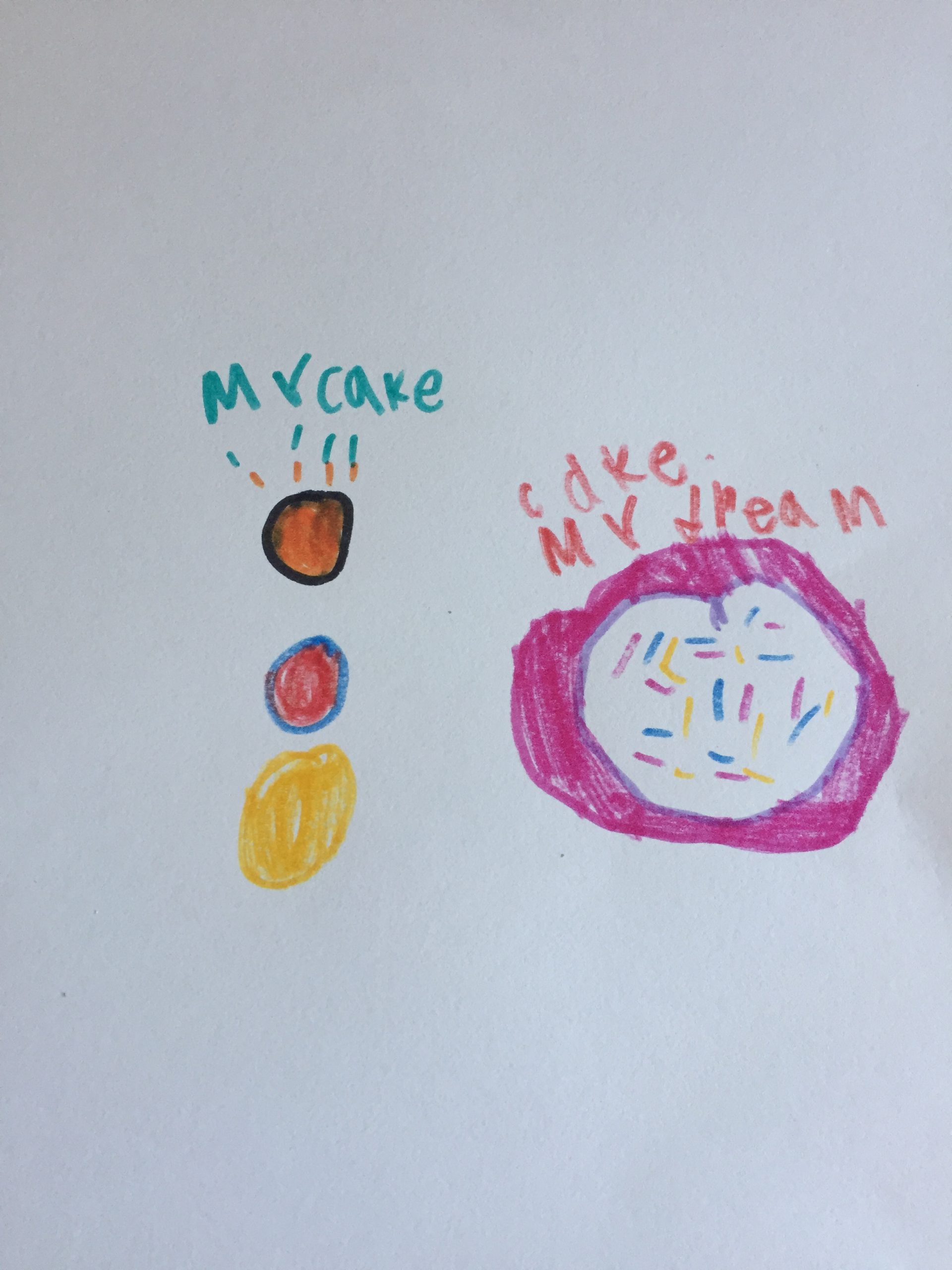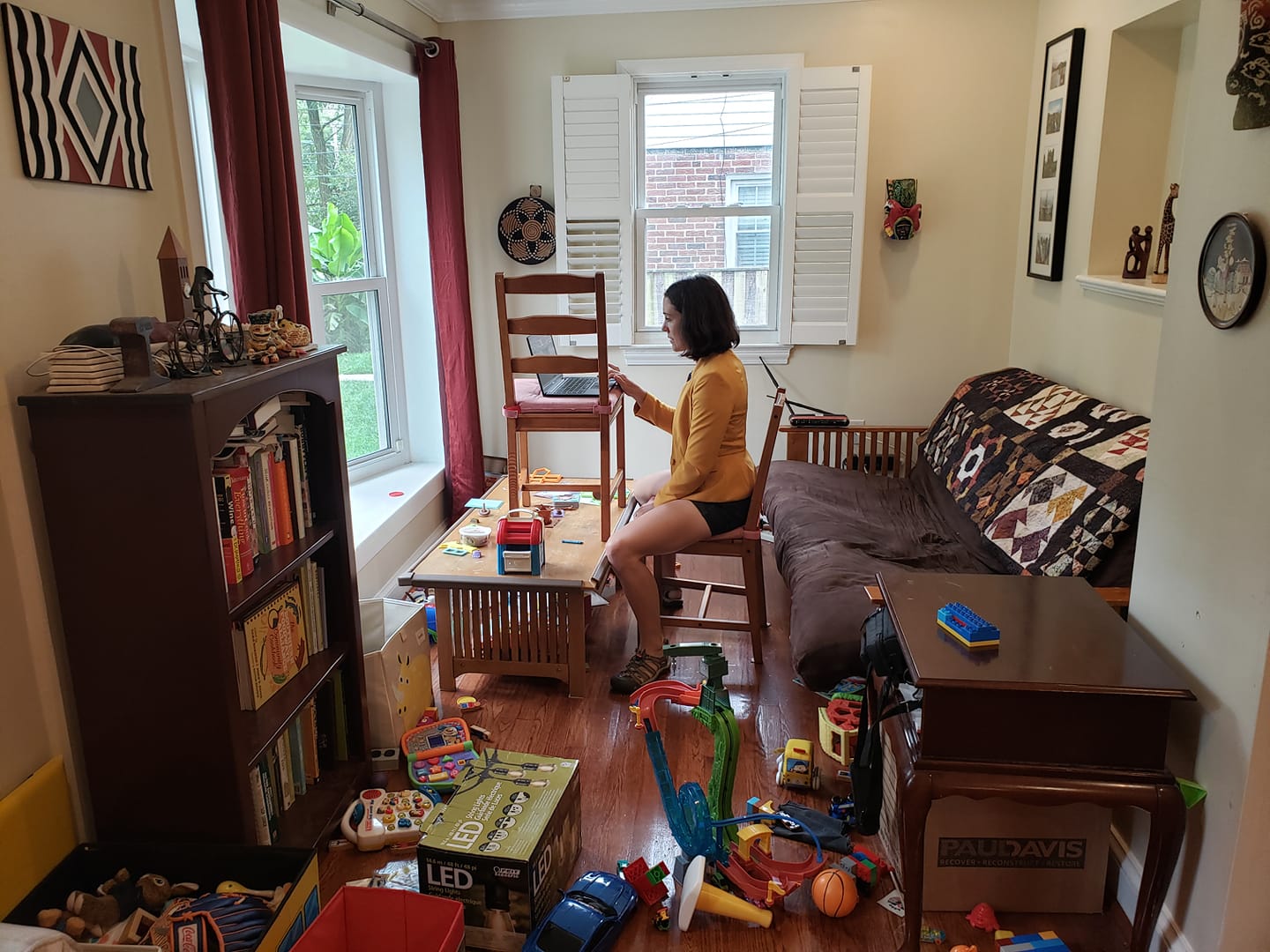“I just need 30-minutes to work, and then I’ll play with you.” I tell my 7-year old, as I sit down to write this blog entry.
13-minutes in, she comes out of her room to show me the art she drew.

“Wow!” I respond, trying to hide my anxiousness over writing this. “These are great!”
She then asks me the inevitable question: “How much time is left?”
“17-minutes,” I tell her.
“Okay!” She responds. “I’ll just wait out here.”
She opens a kitchen cupboard and says, “I think I’m going to have a snack. Can I have one of these lollipops?”
This then turns into a conversation about the blow pops, when we got new ones (we didn’t), and how they are cherry flavored. She starts to eat one, asks me what I’m writing, and then says, “Oh, I have something funny I have to tell you!” She describes a visit from the counselor at her school; this week, the students are learning about kindness. I catch bits and pieces, my attention here on the page and there with her story. She crunches on the lollipop by the window, pulling on the blind drawstring, and watching the wind outside. There are a few minutes of quiet before she says, “8-minutes!” and starts spinning the cord around, as it makes whipping noises, cutting through the air. 3-minutes later, “Mommy! Come here, quick, quick, quick! You have to see this!”
There’s a man walking his labradoodle down the street, and the dog is wandering into our complex driveway; she finds this highly entertaining and hilarious.
“That dog is sniffing all of our cars!”
I start here because I want you to feel with me. If empathy is about “coming alongside or feeling with the experiences of an Other rather than feeling for or displacing an Other,” then I want you to feel the sense of being torn between wanting to listen to and connect with a child and wanting to get work done. (Blankenship 6). I want you to feel the sense of annoyance that comes from the rhythmic crunching of a lollipop as you try to put words to a page. I want you to come alongside my life as a divorced parent trying to get work done while my child waits for me to play. I – we – need this now more than ever–empathy during the pandemic.

Despite the need for empathy at all times, during the summer and the early stages of the pandemic, I was struck by the responses of colleges and universities, especially those that showed a complete lack of empathy for parents. Let’s not forget how Florida State University quickly became notorious for issuing a policy stating that employees could not care for children while working remotely (Hassanein 2020). While they backtracked on this policy, stating it was intended for staff and not professors (does that really make it any better?), their “flexible” work options still included compromises like working on nights and weekends or taking personal leave. There were other colleges and universities that returned to F2F instruction in the Fall, and then denied remote teaching opportunities to faculty who are primary caregivers of high risk loved ones (Pettit, 2020). However, some schools, like the California State University system decided early on to return virtually in the Fall, and others, like Yale University organized various childcare solutions including also a homework tutoring service for students in grades K-12 at no cost. These responses show an understanding of parenting needs, but within the larger parenting population, single moms remain nearly invisible in conversations about parenting struggles and support needs during the pandemic (Ségeral 2020).
In a brief video about empathy, Brené Brown explains how empathy “fuels connection” (2016). Single moms in academia need connection; they need empathy. In an IRB-approved study where I surveyed single parents about their experiences during the pandemic, single moms shared how empathy is especially essential as many are alone and isolated, parenting 24/7 without “the support of others to confide in or talk to.” They have lost connections they worked so hard to build. They’re left to make decisions about their children when “none of the choices about your children’s wellbeing feel particularly great.” When I surveyed single parents about what they felt would help others better understand their experiences, one single mom wrote:
“Simple things, like running out for milk, are complicated when there’s no one else around because it involves taking the child everywhere (no childcare, neighbors are also isolating). Kids weren’t allowed in some stores. What are we supposed to do? It’s the simple everyday routines that we have learned to make very organized because we’re working single parents. COVID-19 disrupted all those routines and now we have to figure out how to reorganize the everyday under very surreal circumstances, and we have to do it mostly by ourselves. So the underlying levels of anxiety are high for me. I may seem like I have it all together on the outside, but on the inside, I’m falling apart.”
I share this at length because, again, I want you to feel with this single mom.
So what do we do about this? How do we extend empathy to single moms and others more generally during this time?
Reach out and ask, “How are you doing? What can I do to help? What do you need?” Do this in an email, a text message, a phone call, a card in the mail. And genuinely mean it. Ask, listen, and respond because you care. Avoid the “I don’t know how you do it” or “I know what you’re going through because my spouse has been out-of-town for the weekend” comments. These are condescending and microaggressive. Show empathy through action–understand that kids come first and may appear on video calls (be okay with videos and/or mics off), post recordings of videos and/or summaries of the content, adjust requirements for service and publishing, allow for flexible schedules, normalize boundaries (for example: only send emails during typical work hours), and stop unnecessary meetings (one single mom shared that her chair scheduled 23 meetings in a month!).
If we don’t show empathy for single moms, they suffer. These people are our colleagues, our instructors, and our students. Working toward coming alongside and feeling with can go a long way to addressing feelings of loneliness, exhaustion, and isolation not only for single moms but also for those in a range of familial structures. At the end of the day, we want you to feel with us. We want you to understand that sometimes we’re doing work with a blow pop crunching in the background, or as Robin Silbergleid describes while sitting in a car in the driveway during a rainstorm while our kids fight inside over a baking project because it’s the only quiet we can get (116). We’re trying to connect with our children, and we’re hoping others will reach out to connect with us.
A Note: While single parents as a whole are often underrepresented in these conversations and while all parents would benefit from the empathy I describe here, I focus on single moms because they are often marginalized and stigmatized in ways single fathers are not, and also because single mothers have “been further marginalized by the pandemic” (Sidel 22-23; Ségeral 140). Additionally, in inviting single parents to respond to the survey I completed, only those identifying as single moms responded.
References
Blankenship, Lisa. Changing the Subject: A Theory of Rhetorical Empathy. Louisville, University Press of Colorado, 2019.
Hassanein, Nada. “COVID-19: FSU clarifies notice to employees requiring outside childcare during remote work.” Tallahassee Democrat, 2 July 2020. https://www.tallahassee.com/story/news/2020/07/02/covid-19-fsu-backing-off-notice-employees-requiring-outside-child-care-during-remote-work/5363086002/.
Pettit, Emma. “Who Gets to Teach Remotely? The Decisions are Getting Personal.” The Chronicle of Higher Education, 22 June 2020. https://www.chronicle.com/article/Who-Gets-to-Teach-Remotely-/249035?cid=wsinglestory_hp_1a.
Ségeral, Nathalie. “Academic Mothering during a Pandemic.” Journal of the Motherhood Initiative, Vol. 11 and 12: 1, 2, Fall 2020/Spring 2021, pp. 139-155.
Sidel, Ruth. Unsung Heroines: Single Mothers and the American Dream. University of California Press, 2006.
Silbergleid, Robin. “A Problem of One’s Own: Single Mothering, Self-Reliance, and Care in the Time of the Coronavirus.” Journal of the Motherhood Initiative, Vol. 11 and 12: 1, 2, Fall 2020/Spring 2021, pp. 109-124

1 Comment
This is the ultimate in reality. Thank you Alex, for your transparency.